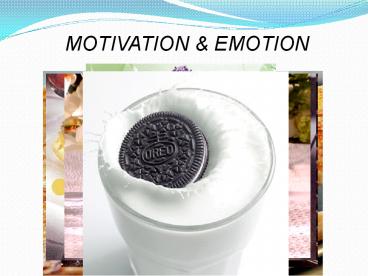MOTIVATION - PowerPoint PPT Presentation
1 / 24
Title:
MOTIVATION
Description:
motivation & emotion – PowerPoint PPT presentation
Number of Views:132
Avg rating:3.0/5.0
Title: MOTIVATION
1
MOTIVATION EMOTION
2
HUNGRY?
What motivates you to eat? Is it physiological
(physical) factors or psychological (mental)
factors? Could it be a combination of both? Did
the pictures in the previous slides make you
hungry? If they did, then you were
psychologically motivated.
3
HUNGRY?
How could Need for Achievement have impacted the
lives of these people?
4
Motivation is an internal state that activates
behavior and directs it toward a goal
5
FOUR THEORIES OF MOTIVATION
- Instincts
- Drive-Reduction Theory
- Incentive theory
- Cognitive theory
6
INSTINCT THEORY
We are motivated by a variety of instincts
(innate tendencies that determine behavior)
- early 1900s.
- Do not explain behavior simply label it
7
Drive-Reduction Theory
We have needs that produce drives (an internal
condition that orients an individual toward a
specific goal)
Biological needs drive us to action. We are
motivated/driven to reduce our needs.
- Hunger drives us to eat
- Fatigue drives us to rest
Focuses on physiological needs
8
Its more than just a DRIVE Infant attachment
to their mothers
Drive-Reduction Theory Hunger Thirst
Harry Harlow proved that a loving, comforting
touch (contact comfort) motivated monkeys more
than hunger or thirst. Incentives (things we
learn to value) are a key to motivation
9
INCENTIVE THEORY
Incentives are an external stimulus, reinforcer,
or reward that motivates behavior
Drives and Incentives work together
Hunger may cause you to walk to the café (drive).
The incentive is the cheese steak.
10
COGNITIVE THEORY
Actions are the result of Intrinsic extrinsic
motivations
Intrinsic comes from within. We engage in
behaviors because they are personally rewarding
Extrinsic comes from outside. We engage in
behaviors that reduce biological needs or help us
obtain incentives or external rewards
11
Biological Needs - physiological requirements
necessary for survival
Social Needs psychological needs acquired
through learning and experience
Studies showed that Obese people eat because of
external (social) cues more than normal weight
people. What influences our eating habits?
12
BIOLOGICAL/PHYSIOLOGICAL HUNGER FACTORS
- Our body and brain send cues that cause us to
eat. - The stomach, liver, and intestines send hunger
cues - The hypothalamus in the brain receives the cues
from your organs and signals you to eat.
GENETIC HUNGER FACTORS
- Inherited instructions found in our genes.
- Determine metabolic rate
- Everyone has a set point (a certain level of
body fat that our bodies strive to maintain
constant throughout our lives)
SOCIAL/PSYCHOLOGICAL HUNGER FACTORS
- Things you learn about eating
- Ex. Eating while watching television
- Ex. Peer pressure to stay a certain weight
13
Need for Achievement Social Motive
Desire to set challenging goals and persist in
trying to reach those goals
What role does it play in the life of a high
school student?
Fear of Failure Social motivate
How can fear of failure impact your motivation?
14
Maslows Hierarchy of Needs
Which needs to we satisfy first?
15
EMOTIONS
Emotion is a set of complex reactions to stimuli
involving subjective feelings, physiological
arousal, and observable behavior.
16
Motivation Emotion
Motivation is the source of our behavior. Emotion
is the feelings associated with our behavior.
- Emotions can function as motivation
- i.e. Hit someone because you are angry
- i.e. do it because it makes you happy
17
Four Components of Emotion
- Interpret, appraise some stimulus (ex. Shark
serious threat) - Experience a feeling (fear, terror)
- Physiological response (heart rate or breathing
change) - Show observable behaviors (cry, panic, freeze)
18
There is a large debate on the order that the
four basic components occur in.
Therefore, we have different theories on Emotion.
- Physiological Theories
- Cognitive Theories
19
Physiological Theories of Emotion
Main Belief Emotions derive from physical
changes in the body
Physiological changes MAY NOT CAUSE emotions but
they certainly increase their intensity. i.e.
fear heightened when heart races (panic attack)
20
Physiological Theories
- James-Lange theory Physiological (bodily)
reactions cause you to feel fear, sorrow, or
anger - Cannon-Bard theory physiological arousal and
emotional experience occur simultaneously (your
heart begins pounding as you experience fear one
does not cause the other)
21
Cognitive Theories of Emotion
- Main Belief Emotions result from mental
processes and physiological changes working
together - Schachter-Singer (two-factor) theory physical
arousal and the cognitive label occur at the same
time the emotion comes later
22
Universal Facial Expressions
Paul Ekman some facial expressions are
universal few of us (10 20) could hide true
emotions
How can this information help us in life?
Anger Fear Sadness Surprise Happiness Disgust Cont
empt
23
Sex Motivation
Is the desire to have sex biologically motivated,
socially motivated, or both?
Sex glands secrete hormones that control sexual
interest (Biological)
status, peer pressure, money (Social)
24
GENDER INFLUENCE ON SEXUAL MOTIVATION
MALE FEMALE
More interested in sex initiate and think about sex more often Less interested in sex
Want sex with more partners Not as interested in sex with many partners
Desire sex without emotional commitment Desire sex with emotional commitment
Focus on youth and physical attractiveness when choosing a sex partner Focus on social and economic status when choosing a sex partner
Feel more jealous when partner is physically unfaithful Feel more jealous when partner is emotionally unfaithful

